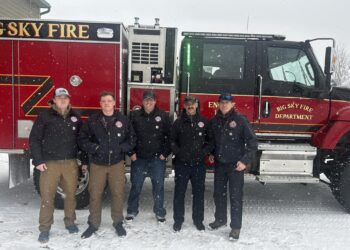By Mira Brody EBS Staff
BIG SKY/BOZEMAN – At full capacity, Montana Ale Works in Bozeman employs 140 staff members, 40 of which are kitchen staff. Ale Works, like many Gallatin County restaurants and retailers along with thousands nationwide, is reopening after more than a month-long hiatus. What that means for eateries and brick-and-mortar retail stores is a mystery yet to be solved.
“I kind of want to wait and see how Bozeman is going to react and see how other restaurants are doing it,” said Roth Jordan, managing partner and corporate chef at Ale Works. “Part of it is making sure our employees are comfortable coming back to work.”
As Phase 1 of Gov. Steve Bullock’s economic reopening plan unfurls in Big Sky and Gallatin County, many businesses are deciding when and how to reopen and adapting their practices to meet country health department and CDC guidelines. On Monday, April 27, nonessential businesses such as retail stores were given the green light to reopen, and on Monday May 4, restaurants and bars will join them.
Stay-at-home orders shuttered nonessential businesses across the state and reopening for many will be a dance of caution, not only in following new sanitation guidelines, but also in re-employing their workers and meeting the already narrow margins that come with being a small business operation.
Ale Works has been a beer and culinary staple of downtown Bozeman since 2000 and is credited to being the busiest dinner-only restaurant in the state. The restaurant had to lay off 120 employees in March when dine-in restrictions were first enacted, according to Jordan.
Saffron Table, another popular dinner haunt in Bozeman, made the difficult decision to not reopen at all, and after six years in business have shut their doors permanently.
Gallatin County City-County Health Department requirements include stores and restaurants operating at half capacity, placing tables at least six feet apart, eliminating waiting rooms and other gathering areas, limiting tables to family-only and under six people, and encouraging heightened sanitation for both employees and patrons. Additionally, the only seating can be at tables, which means bar areas must remain closed and all establishments must close no later than 11:30 p.m.
“We definitely are [taking precautions],” said Serena Calder, the assistant buyer at Grizzly Outfitters in Big Sky Town Center. The outdoor gear shop has been open from 10 a.m. to 6 p.m. all week. “We have a couple signs up as you walk in encouraging people to wash their hands and use masks if they have them. We are following all recommendations and CDC guidelines and are encouraging all of our customers to do the same.”
Both Calder and Daniel Roberts, manager at East Slope Outdoors in Big Sky, have found that capacity restrictions have not yet been an issue: It’s shoulder season in many mountain towns and with Big Sky Resort being closed, now is a slow time of year for tourism regardless of a nationwide pandemic.
Many business owners spoke of the uncertainty surrounding operations moving forward.
“We don’t really know what to expect yet,” said Angell Zamora, store manager of Montana Supply, a lifestyle clothier in Big Sky Town Center. Zamora opened May 1 and in addition to providing optional gloves to patrons, is also requiring staff to wear masks and sanitize dressing rooms after each use.
For many, adhering to the ever-changing regulations has been a trial by fire. When dine-in restrictions were first enacted, Ale Works was enthusiastically offering takeout. As the situation progressed, however, management felt it was in the best interest and health of their staff to close entirely.
Now Ale Works is working on a phased rehiring plan. They will bring back some hourly workers this week for takeout, and more servers and bartenders once they open for dine-in. Although it will be dictated by customer volume, the goal is to rehire all 120 employees that were laid off in March.
Jordan said it was already in the works to reopen on May 4 for takeout and delivery, and now that Phase 1 is officially in place, they have their eyes set on a reopening dine-in options on May 18. In addition to ramping up sanitation practices, the restaurant will have attendants on staff to monitor and clean shared areas such as the restroom, and are working on a reservation system that allows patrons to reserve a table then receive a text when their table is ready so that they can wait for a table from the safety of their home. Although they cannot open the bar area, Ale Works will allow seating on their coveted summertime patio.
Twist Thompson, owner of Blue Buddha Sushi in Big Sky, plans to reopen with a limited menu on May 13. He has been working with his food service distributor to get a strong but safe sanitizing solution his staff can use to frequently clean the restaurant and is putting additional filtration on their air-conditioning vents. He hopes to be able to rehire his full staff as well when Blue Buddha reopens its patio.
But reopening at half capacity and adhering to other social distancing measures is a difficult practice and one that no restaurant has dealt with before.
“What it really just comes down to is our operations being a little more tedious,” said Alex Omania, owner of the Lotus Pad in Big Sky. When the Lotus Pad reopens on May 6, in addition to heightened sanitation and half capacity, they will be monitoring employee symptoms, eliminating high-touch areas such as condiment caddies and chopstick holders, and will have those waiting for a table or takeout food do so in their car instead of in the lobby.
Omania said shoulder season has helped give businesses an extra buffer of time to adapt. “My main concern is the energy and how it makes people feel,” she said. “I opened my restaurant because I wanted a fun environment.”
Like Omania, Greg Lisk, owner of Gallatin Riverhouse Grill on Highway 191 south of Big Sky, is having employees watch the webinars produced by the Gallatin City-County Health Department aimed at informing service industry workers of new sanitization standards expected of food and beverage establishments.
At a board meeting on May 1, Health Department Health Officer Matt Kelley said the department has released 10 different webinars for critical industries such as restaurants, places of worship, childcare center and hotels, which have all garnered high participation. He said there will also be community sanitarians conducting walk-throughs to train employees and answer questions.
“The really exciting part is that since we announced we were reopening every single employee showed up,” said Lisk, who intends to rehire his full staff. The Riverhouse has been open for takeout, and will reopen for dine-in with their full menu on May 5.
“It’ll show the locals that we’re there for them,” Lisk said. “We could not do this without them. We just want to see people coming in, sitting down and having drinks again.”
Among the uncertainty, most business owners voiced the same resounding message—that at the end of the day, their primary concern is always making sure staff and customers feel comfortable.










